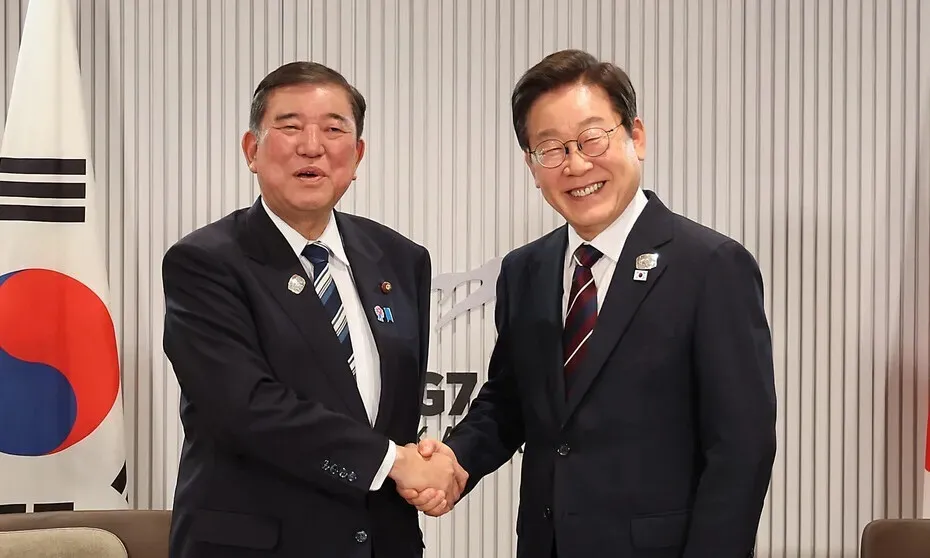
Japanese Prime Minister Shigeru Ishiba (left) and South Korean President Lee Jae Myung shake hands during their summit on the sidelines of the Group of Seven summit in Kananaskis, Canada, on June 17, 2025. (Kim Tae-hyeong/Hankyoreh)
Korean President Lee Jae Myung will be visiting Japan on Aug. 23-24 to hold a summit with the Japanese prime minister.
The schedule will have Lee, who took office in early June, visit Japan before the US (Aug. 24-26), which is thought to reflect Lee’s conciliatory approach to Japan.
“President Lee will visit Japan on Aug. 23-24 before his visit to the US. His itinerary there includes a summit and dinner with Japanese Prime Minister Shigeru Ishiba,” said Kang Yu-jung, spokesperson of Lee’s presidential office, in a briefing on Wednesday.
This will be Lee’s second summit with Ishiba, following a meeting during the Group of Seven summit in Canada on June 18, just under two months ago.
It’s quite unusual for a newly inaugurated Korean president to visit Japan before the US. In fact, the last president who did so was Syngman Rhee, in the mid-20th century.
“There’s no particular message here; this is just the itinerary that emerged from our scheduling efforts,” Kang said.
Nevertheless, the fact that Lee is visiting Japan before the US is thought to reflect his administration’s priority on Korea-Japan relations.
Lee is known for his pragmatic approach to foreign policy. Since his inauguration, he has made a series of propitiatory gestures to Japan.
Japanese politicians were initially anxious that Lee would exhibit a strong anti-Japanese slant, but have been reassured by his unexpectedly cordial attitude.
Lee’s stance toward Japan appears to reflect his view that it would be foolhardy to open up an aggressive new front with Japan while Korea already faces grueling negotiations with the US in the areas of tariffs and national security.
Lee arranging a summit with Japan on the eve of his visit to the US may also send a positive signal to the US.
The US has repeatedly pushed for more cooperation between Korea and Japan as part of its security and economic strategies in Northeast Asia. For the Korean and Japanese leaders to meet up and show off chummy relations could reinforce the impression that they’re members of a network of shared values and interests.
There are also hopes that Lee will get some tips about tariffs and security issues during his summit with Ishiba, who has already met with US President Donald Trump.
However, Lee’s good-natured attitude toward Japan has aroused concerns that he may punt on pressing matters, such as outstanding historical disputes.
Those concerns were stirred by Lee’s response to a question on June 4 about whether he would uphold the previous administration’s plan for tackling the issue of Koreans mobilized for forced labor during the Japanese colonial occupation. “I prefer not to mix up separate issues when possible. I’d like to have a reasonable relationship where we cooperate where cooperation is needed and seek an apology where an apology is needed,” the president said at the time.
Foreign policy observers have taken that to mean that Lee will maintain the third-party repayment plan that former President Yoon Suk-yeol developed for Korean victims of forced labor, a sore spot for many.
There are still numerous potentially explosive historical disputes between the two countries, including Japan’s refusal to acknowledge the reality of forced labor in a memorial service held last year for workers at the Sado gold mine.
“We haven’t heard much about historical disputes so far from the Lee administration. I hope it doesn’t continue to ignore the subject during Liberation Day [Aug. 15] and the Korea-Japan summit,” said Yang Kee-ho, a professor of Japanese studies at Sungkonghoe University.
By Shin Hyeong-cheol, staff reporter
Please direct questions or comments to [english@hani.co.kr]

AloJapan.com